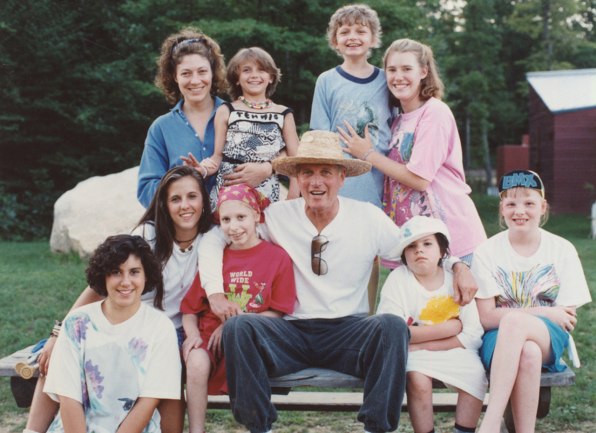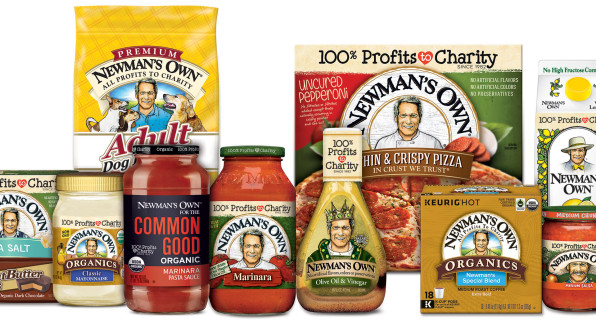Inside The Growing Business Trend Of Giving All Your Profits Away
When the cocktail bar Coup–short for coup d’etat–opened in New York’s East Village in mid-April, promising to donate 100% of all profits to charities whose missions might be affected by the Trump Administration, it joined the rank of a growing number of companies with a fairly nontraditional business plan: Rather than simply make a profit, these places are experimenting with a radical form of conscious capitalism: Cover costs, pay fair wages, and then donate rest in a way that’ll improve society.
The list of companies employing this type of business arrangement now includes Fetch eyewear in Portland, Oregon, which puts all proceeds toward animal rescue, and the Ex Novo brewpub, also in that city, which gives to a rotating menu of local charities addressing things like teenage homeless, or urban farming operations. There’s Finnegan’s, a brewery in Minneapolis with its own community fund to feed the hungry, and Impact Makers, a management and technology consulting firm in Virginia, which is working to fund health clinics and programs addressing child poverty.
“We’re a group of middle-class professionals doing the same work we’ve always done, but structuring it differently and collectively making the same impact in the community as foundations,” says Michael Pirron, the founder and CEO of Impact Makers. “Rather than having to use the traditional model of being an Attila the Hun businessman or businesswoman”–in other words hoarding cash for years until you feel well-off enough to give more away–“it’s democratizing philanthropy for employees.”

While not everyone may end up a billionaire philanthropist like Bill Gates and Warren Buffet, there are more opportunities to join the scrappy upstarts, which, especially, as they grow, may develop enough revenue to become powerful players for social good. Unless they torpedo themselves first by giving away too much too fast without budgeting for future needs. It can be tricky to figure out what exactly counts as “profit” versus necessary reserves.
There’s no typical corporate structure or preferential tax treatment for this kind of company, meaning that profits, regardless of where they are directed, are still subject to business income tax–and questions about how to manage and grow a business while still giving money away abound.
To help answer those questions, the company that originated this model 35 years ago has launched something of a support group. The Newman’s Own Foundation, backed by the same-named salad dressing company (which since moved into lines of pasta sauces, lemonade, popcorn and frozen pizza, among other many things) hosts its own “philanthropic enterprise program,” a network of about two dozen similarly-minded entrepreneurs.
Late actor Paul Newman and his friend A.E Hotcher may have started their company on a whim, but Newman could afford to do so because he was already rich and famous. (“If I had a plan, I would have been screwed,” reads a sign that once hung in his office and is now in the Newman’s Own Foundation’s boardroom.) The group has continued to thrive through careful planning, a competitive notion that executive chairman Bob Forrester admits he still loses sleep over. “Everyday our team has to go out and win the American way, which is as a business that just still puts out a good product,” says Forrester, who is also CEO and president of Newman’s Own Foundation, the philanthropic venue which distributes the donations from the food company.
In essence, philanthropic enterprises operate differently than just plain equality-focused companies or benefit corporations, which prioritize their social missions–with attendant corporate bylines and boards to keep them accountable–but don’t necessarily have to dispense with every last dollar they make.
Creating a buy-one-give-one model (say, Toms Shoes) or infusing your culture with strong pro bono initiatives (Salesforce) is not the same as putting all proceeds toward change making because those models rely on making a difference through scale: Toms donates a lot of shoes because it has a lot of customers buying them. Salesforce can offer free expertise to mission-driven groups because it has the employee power to do so. Acting as a philanthropic enterprise is simpler because it allows small groups to make as large an impact as possible immediately: Whatever extra money is coming in must go back out to help people, end of story.
The giveaway groups began meeting in the summer of 2014. Without a formal consultancy or think tank keeping tabs on this community, the Newman’s Own Foundation and its 25 enterprise members track down other company founders to join the group on their own, largely through word of mouth. Together, these companies share emerging lessons and strategies around everything from offering free services to growing responsibly, effective grant-making techniques, and how to maximize equity at the point of a sale.

Dressed For Success
Paul Newman made his fortune starring in late-60s classics like Cool Hand Luke and Butch Cassidy and The Sundance Kid. Behind the scenes, he was fresh food lover who enjoyed making his own salad dressing. The pursuit went from odd pastime to half-serious business idea, after Newman jarred some of his creation and began handing it out to friends around the holidays–only to be hit up with refill requests.
The best way to hawk the product was to put Newman’s face on the bottle, but Newman, who was humble, didn’t love that idea, Forrester says. His compromise–fine, but you better give all the proceeds to charity–begot the company’s slogan: “Shameless exploitation for the common good.”
Newman’s Own doesn’t release sales figures, but since the early ’80s, it has generated nearly $500 million for charitable works, almost half of that since Newman’s death in 2008. It now gives about $30 million annually to 600 different organizations in areas like improved nutrition, empowerment for veterans and others, and aiding children with life-limiting conditions, along with funding fellowships and programs that encourage more philanthropic work.

Today, other celebs have cited the model as an inspiration, including Hugh Jackman (Laughing Man coffee), Ryan Devlin (This Bar Saves Lives, with Kristen Bell as a founding partner), and Ed Norton (Crowdrise, a crowdfunding platform for nonprofits that was recently acquired by GoFundMe).
Part of the reason for the philanthropic enterprise program is because, even with a rich benefactor, growing a company that tries to donate most of what it makes can be a pretty confusing process. Today, despite its size, the company still follows some lean practices like outsourcing manufacturing to avoid heavy overhead costs. It doesn’t retain any earnings, using a revolving bank loan to cover expenses.
Perhaps the biggest issue, which many new ventures may eventually face, is that Newman’s Own became successful enough to live on past its founder. Early on, Newman personally owned all of the company’s intellectual property, which meant he had ultimate control over where all profits were deposited. That didn’t necessarily mean that whoever succeeded him would choose to run the company the same way.
A few years before his death, Newman created the foundation and turned his company into a proper LLC, allowing him to gradually transfer his ownership stake to the foundation. When he died, the foundation became the sole owner of the operating company, ensuring that it received all profits to distribute in the sort of value-directed approach Newman intended.
While the company is run separately, its new owner has a seat on the board to ensure that actual money making feels appropriately Newman-like. (The business has mostly expanded popular lines, including launching an “Organics” label.) “I said to Paul, ‘If you kick off before I do and you come back 10 years later, you may not know the people in the room, but it will feel right to you,” Forrester says.

A Taste Of The Future
In many ways, these profit-passing companies are still shaping how the industry may work. For instance, as a philanthropic group in charge of an operating company, the Newman’s Own Foundation is now subject to 200% excess business holding tax, which would wipe out its ability to continue doing charity work.
The issue stems from the 1969 Tax Reform Act, which was originally intended to ensure that wealthy individuals don’t set up charities for their own gain. Along with many other regulations, the law stipulates that company owners aren’t allowed to have more than a 20% ownership stake in foundations they support, ensuring those groups will operate independently. It appears that no one considered the possibility of a foundation eventually owning a company that was already operating independently.
The group has until 2018 to convince Congress to pass a new law, which would legalize its business structure, or it must sell 80% of the company to avoid taxes so high they would essentially wipe out the revenue going to charity. Its answer, the Philanthropic Enterprise Act, was written in cooperation with the Joint Committee on Taxation, would keep the current charitable abuse standards intact while formalizing the foundation’s existing way to earn money solely for charitable good.
Now lawmakers must now decide whether to “break up the model” as Forrester puts it, or legitimize it for future companies when dealing with succession.
At least one company within Newman’s idea-sharing network has another concept: Pirron, at Impact Makers, started the financial services company as a for-profit benefit corporation in 2006, dividing its equity between two public charities, a community foundation in central Virginia, and nonprofit that owns a community development bank. The company, a certified B Corp, has since grown from one employee with a laptop to 130 employees generating more than $20 million annually, which gets donated to various health and child safety net groups the business supports.
Pirron, whose company competes with Deloitte, Accenture, and Price Waterhouse Cooper, expects Impact Makers to reach a valuation of $100 million within seven to 10 years, at which point, he’ll sell the company, creating generous endowments for the philanthropic stakeholders who already hold interest. In the meantime, he says employees are paid market rate salaries and will receive a “change of control” bonus at the time of sale.
The business model itself doesn’t really attract business. “Our clients are corporate clients and they buy on capabilities and price, which just means be the best quality and deliver like any other consulting firm,” he says, noting that the commitment to give-it-all-away is at best a potential “tiebreaker” if they ever offered a matching bid for work.
What it does attract are employees who want to be there because they believe in the bigger goal. Over the last 10 years, Impact Makers has had about a 3% turnover rate in an industry where double-digit quit rates are common. “We have an unbelievably high retention rate and that’s really helped us grow because our clients see the value of our consultants staying on projects,” Pirron says.
He believes his team performs better than others because the stakes are larger than the next payday, a concept that’s supported by and body of research around how shared values within workplaces can increase company performance. That’s an idea that more companies seem interested in bottling and selling.
Newman’s Own pioneered the idea of a philanthropic enterprise. Now, it’s helping to coalesce a new movement.
When the cocktail bar Coup–short for coup d’etat–opened in New York’s East Village in mid-April, promising to donate 100% of all profits to charities whose missions might be affected by the Trump Administration, it joined the rank of a growing number of companies with a fairly nontraditional business plan: Rather than simply make a profit, these places are experimenting radical form of conscious capitalism: Cover costs, pay fair wages, and then donate rest in a way that’ll improve society.
Fast Company , Read Full Story
(33)













